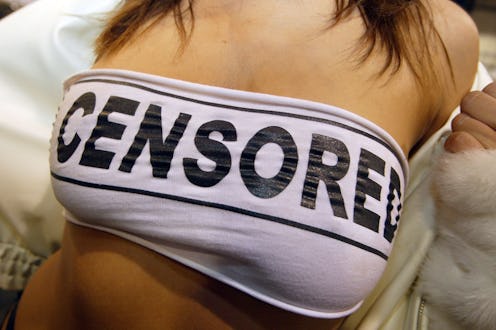News
How One Woman Is Fighting Revenge Porn
The Internet is a pretty great place most of the time, but if you're in possession of a vagina, you've probably noticed that it's not exactly kind to women. One of the many consequences of the thinly-veiled misogyny rampant online is revenge porn, the form of online bullying in which bitter exes post explicit photos or videos of their former partners online without their consent. Many women are now unfairly being forced to learn the same lesson as politicians who can't keep it in their pants: once something is online, it's nigh-impossible to remove, which is why one woman had to copyright her breasts in order to remove intimate photos from the Internet. "Hilary," who goes by a pseudonym for obvious reasons, was in a long-distance relationship when she took numerous explicit photos for her partner, Cosmopolitan reports. "[My ex] continually asked [me] to send photos, and it was uncomfortable at first," she told CNN Money . "But I figured, 'You're in love so why not?'" Unfortunately, she found out her trust was misplaced when the couple broke up and her ex put the private photos online to humiliate her. The Internet is still relatively new as far as legislature goes, and many states have yet to pass laws criminalizing revenge porn out of fear for infringing on free speech. In fact, only 16 states have laws against it. That means that in two-thirds of the United States, revenge porn is totally legal.
As a result, victims like Hilary are forced to go to extreme lengths to regain control over the images. In the event of a website refusing to remove pictures when asked, it's possible to file for copyright infringement in order to force them to take content down. In order to sue for copyright infringement, however, the images have to be copyrighted in the first place, which is how Hilary found herself talking to government officials about copyrighting her breasts.
According to CNN Money, getting something copyrighted isn't all that difficult. It can get incredibly awkward, however, because the Copyright Office requires applicants to provide a copy of the material they want copyrighted. "I thought, well no, this must be wrong ... they're forcing me to disclose them further when that's what I was trying to prevent," Hilary told CNN Money.
Although only the person reviewing the application would see the file, it was too awkward for Hilary to copyright everything her ex posted. She tried to provide stills from the videos instead of the entire footage, but the Copyright Office denied her application. In the end, she decided not to copyright the videos. She did copyright more than 100 images of herself, however, which required three different registrations.
Incredibly enough, Hilary could actually be considered fortunate. According to her lawyer, Elisa D'Amico, taking the photos herself gave her “more rights in terms of being able to pull down that information from online." If someone else had taken the photos, her case would have been "a little bit more tricky."
Even with her copyright, Hilary can still find explicit photos when she searches herself on Google. Revenge porn is incredibly difficult to eradicate, and as a result, victims across the world are coming up with increasingly creative ways to reclaim their bodies and their privacy. Thankfully, the legislation seems to be working in the few states that have it — just last month, revenge porn website creator Kevin Bollaert was convicted on 27 felony counts and could spend up to 20 years in prison. Oh, and he (very publicly) cried at the verdict, which the Internet had an absolute field day with. If you feel bad, remember that this is the same guy who charged women money to take down explicit photos, some of which were taken while the subjects were underage. Crying in public is nothing compared to the humiliation he put thousands of women through.
As usual, the brunt of the blame for revenge porn goes to the victims. Remember when all those celebrities' nude photos were leaked online last year? Do you also remember how most of the Internet responded? "If you don't want photos like that online, don't take them in the first place" is a frequent refrain when debating how to put a stop to the phenomenon. It's the same reasoning that causes police to teach rape safety to girls but teach boys nothing about consent, or interrupting girls' education to enforce dress codes instead of putting a stop to the sexualization of teenagers. (Come on, people. Shoulders aren't going to distract boys from learning.)
On the bright side, students protesting dress codes have been all over the news lately, and campaigns educating the public about consent have become more popular in recent years. Let's hope the trend continues.
Images: asksheldon-tbbt/Tumblr, Giphy
